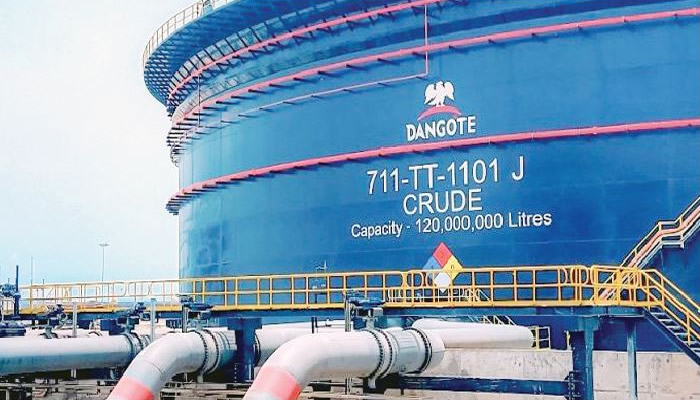Dangote Petroleum Refinery has announced that it reached a remarkable milestone by exporting one million tonnes of petrol within just fifty days of ramping up its production. This achievement, the refinery stated, highlights its rapid ascent from a national supplier to a formidable player in the global refined fuels market—signaling Nigeria’s evolving energy independence and export capability.
Situated in the Lekki Free Trade Zone, Dangote’s refinery boasts a nameplate capacity of 650,000 barrels per day, making it the largest single-train oil refinery in the world. Shortly after commencing operations, the facility didn’t just begin meeting domestic demand—it began exporting. According to the company, it consistently despatched tanker cargoes of petrol, totaling one million tonnes of exports across a fifty-day window. If accurate, this translates to average exports of about 20,000 tonnes per day, a significant volume with transformative implications for the regional and international fuel trade.

As evidence of the refinery’s export activity, industry observers point to several high-profile shipments. Among them was a 90,000-tonne petrol cargo shipped to Asia—a major leap that positioned Nigeria in new fuel markets. There have also been deliveries of diesel and jet fuel to markets including West Africa and the Middle East, with some refined product purchased by major industry names like Saudi Aramco. These deals reflect expanding reach and growing confidence in both product quality and logistics capabilities.
For Nigeria, the importance of this shift cannot be overstated. The country historically relied heavily on imported refined products, despite being Africa’s largest crude oil producer. Dangote’s ability to reduce—and in some months eliminate—petrol imports has brought significant macroeconomic relief, saving billions in foreign exchange. Achieving one million tonnes in fifty days exports is a bold proclamation that it is capable of reversing Nigeria’s long-standing net import status.
However, analysts caution that these figures may be aspirational until independently verified. Bulk cargo sizes vary, and while shipments of 90,000 tonnes are plausible, maintaining such pace over an extended period would require continuous production outputs and flawless logistics. Moreover, the refinery must balance domestic obligations against export ambitions, especially during months of tight local supply due to market restructuring and policy reforms.
Industry insiders point out that proving one million tonnes of export requires detailed shipping records, customs documentation, and port clearances over the specified period. While Dangote’s export levels are undeniably rising, reaching that milestone in just fifty days may demand a broader window or record of multiple tanker movements. Observers say that transparent tracking would help external stakeholders, including financial partners and host communities, assess the capacity of the refinery and offer greater assurance around contractual commitments.
The potential ramifications of these exports are significant. Export-oriented refinery activity positions Nigeria to become a regional fuel trade hub. It brings opportunities for investment in storage, pipelines, port infrastructure, and regional distribution networks. In particular, storage terminal developments in places such as Namibia and Ghana have already been proposed, which would allow Dangote to consolidate its role across Africa and strengthen logistical resilience.
Moreover, export revenue from refined products could help stabilize Nigeria’s forex reserves by even further reducing import demands. Increased export volumes also create room to improve trade balances and attract foreign investment into the energy sector, as investors see proof of global market access and operational effectiveness.
Domestically, reliance on local production could bring sustained fuel supply stability. Nigeria has previously suffered shortages, queue crises, and buffer stock issues. With petrol flowing into export markets at such scale, the potential exists to reallocate resources to ensure reliable distribution in all regions, even as some volumes head abroad.
Challenges remain, however. Securing consistent crude feedstock is essential—Dangote depends partly on imports to maintain plant operations. Furthermore, the health of refined product exports depends on infrastructure like pipelines and port access, which require coordinated investment and policy support. Market distortions—caused by subsidies or forex scarcity—can also influence profitability and planning for export commitments.
Strategically, Dangote’s announcement may serve several purposes. First, it establishes the refinery’s credibility by declaring its ambition transparently to global markets. Second, it sets a benchmark, positioning the plant alongside global peers in terms of volume and efficiency. Third, the bold claim adds to national prestige, suggesting operational success born within Nigeria’s private sector.
Nigeria’s government has supported the refinery’s export drive, introducing policy incentives such as tax breaks on export earnings, streamlined port clearance measures, and assurances of diesel availability sourced locally. These measures have helped shift private sector sentiment and reduce historical obstacles to large-scale exports.
Yet, some critics argue that domestic fuel supply must remain a priority, arguing that export-driven production should not compromise local access or affordability. They suggest that any export milestone must be matched by clear milestones in domestic distribution and pricing stability.
Despite divergent views, Dangote’s goal carries clear ambition—and potential. As it pushes toward global markets, further independent confirmation of volumes and deliveries will prove vital. Established export capacity could attract international refiners, traders, and shipping lines, enhancing economic activity across multiple infrastructure and service sectors. This would mark a shift in Nigeria’s role—from resource exporter to petrochemical and refined product hub.
In conclusion, Dangote Petroleum Refinery’s declaration of exporting one million tonnes of petrol in fifty days presents a bold statement. While the scale naturally invites scrutiny, it undeniably demonstrates Nigeria’s emerging strengths in domestic refining and global fuel commerce. Should the claim withstand verification, it would confirm that Dangote has moved beyond local market dominance to become a key player on the global energy stage—fueling both Nigeria’s economy and its reputation in a competitive global marketplace.
Support InfoStride News' Credible Journalism: Only credible journalism can guarantee a fair, accountable and transparent society, including democracy and government. It involves a lot of efforts and money. We need your support. Click here to Donate
